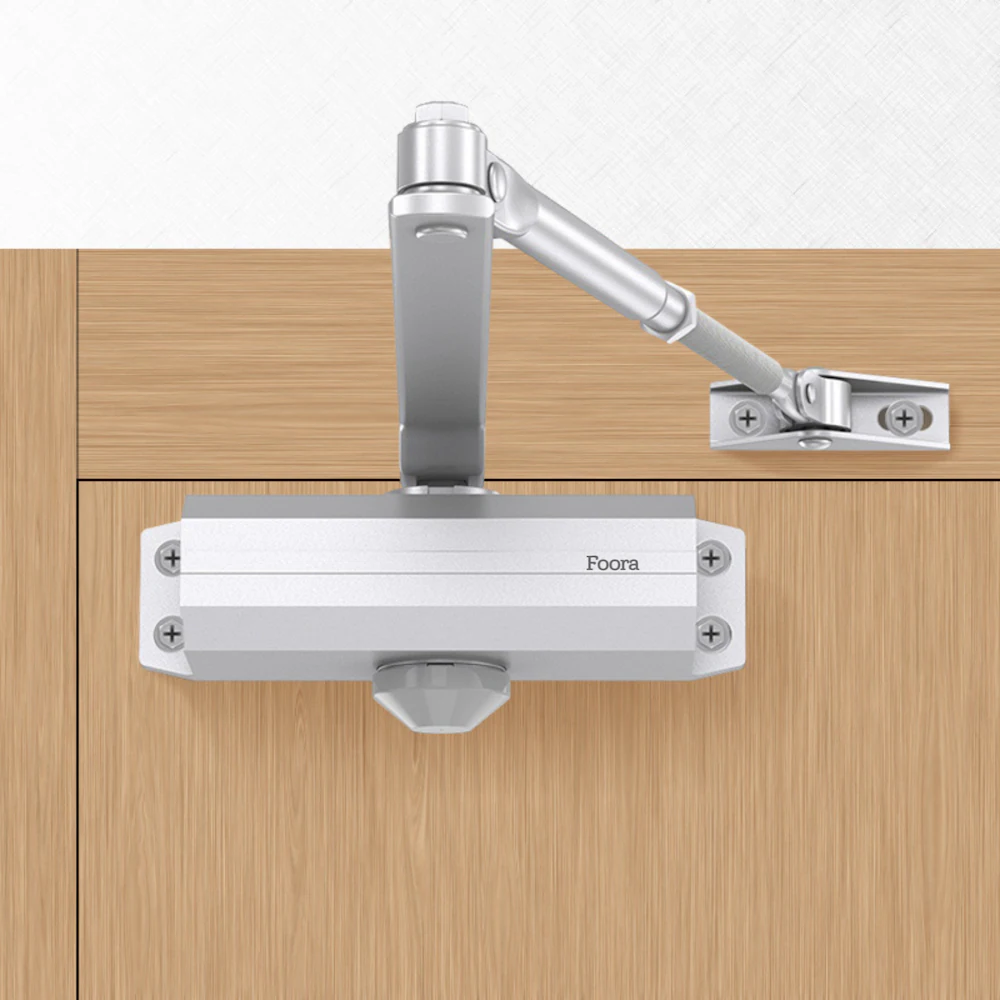Choosing the Right Hydraulic Door Closer: A Guide for Manufacturers

Hydraulic Door Closer
Introduction
Welcome to our blog post on choosing the right Hydraulic Door Closers manufacturers Ambala! If you’re in the business of manufacturing doors, you know that functionality and durability are key factors when it comes to creating a quality product. And one crucial component that plays a significant role in achieving these qualities is the hydraulic door closer.
In this article, we’ll delve into everything you need to know about hydraulic door closers – from their benefits for manufacturers to different types available in the market. We’ll also cover important factors to consider when selecting the perfect hydraulic door closer for your needs, along with maintenance and troubleshooting tips.
So, whether you’re looking to enhance security, improve accessibility or simply upgrade your existing door closing mechanism, sit back and let us guide you through the world of hydraulic door closers. Let’s get started!
Benefits of Using a Hydraulic Door Closer for Manufacturers
Hydraulic door closers offer a range of benefits for manufacturers. These devices are designed to provide controlled and smooth closing of doors, ensuring safety and convenience in various industrial settings.
One of the key advantages of using a hydraulic door closer is improved energy efficiency. By automatically closing doors after they have been opened, these closers help prevent air leakage and maintain optimal temperature levels within manufacturing facilities. This not only helps reduce heating or cooling costs but also creates a more comfortable working environment for employees.
In addition to energy savings, hydraulic door closers enhance security by ensuring that doors are always closed properly. This prevents unauthorized access and reduces the risk of theft or damage to valuable equipment or inventory.
Another benefit is the ease of installation and use. Hydraulic door closers can be easily installed on both new doors and existing ones without major modifications or disruptions to daily operations. Once installed, these systems require minimal maintenance, saving time and effort for manufacturers.
Furthermore, hydraulic door closers contribute to improved accessibility in manufacturing facilities by providing adjustable closing speeds. This allows easy access for individuals with disabilities or mobility challenges while still maintaining proper closure for security purposes.
Investing in a high-quality hydraulic door closer can greatly benefit manufacturers by improving energy efficiency, enhancing security measures, simplifying installation processes, reducing maintenance requirements, and promoting accessibility within their premises
Types of Hydraulic Door Closers and Their Functions
Hydraulic door closers come in various types, each designed to suit different applications and requirements. Understanding the different types available can help manufacturers choose the right one for their specific needs.
1. Surface-Mounted Door Closer: This type is installed on the surface of the door frame and offers a versatile solution for both residential and commercial doors. It provides controlled closing speed and has adjustable closing force options.
2. Concealed Door Closer: As its name suggests, this type is hidden within the door or frame, offering a more aesthetically pleasing appearance. It is commonly used in high-end architectural settings where design plays a crucial role while ensuring smooth door operation.
3. Floor-Spring Door Closer: Ideal for heavy-duty doors, such as those found in commercial buildings or entranceways with glass panels, floor-spring closers are installed directly into the floor beneath the door. They provide exceptional control over large or heavy doors without compromising aesthetics.
4. Overhead Door Closer: These closers are mounted on top of the door frame and have a traditional appearance suitable for both residential and commercial use. They offer adjustable closing speeds to ensure smooth operation while maintaining security.
5. Rack-and-Pinion Door Closer: Commonly used in commercial settings, rack-and-pinion closers utilize gears that control the opening and closing motion of the door systematically. They provide reliable performance even under high traffic conditions.
Each type of hydraulic closer serves a distinct purpose depending on factors such as usage frequency, weight capacity, desired aesthetics, and building regulations compliance.
When selecting which type to use in your manufacturing facility or project installation, consider factors like budget constraints, required functionality (such as delayed action or hold-open features), durability expectations based on anticipated usage volume, fire code compliance if necessary — all these aspects will influence your decision-making process significantly.
Remember to consult with professionals in the industry or reputable manufacturers to ensure you choose the most suitable hydraulic door closer
Factors to Consider When Choosing a Hydraulic Door Closer
Door Size and Weight: The first factor to consider when choosing a hydraulic door closer is the size and weight of the door. Different closers are designed to handle different door sizes and weights, so it’s important to choose one that matches your specific needs.
2. Closing Speed: Another factor to consider is the closing speed of the door closer. Some doors may need to close quickly for security purposes, while others may require a slower closing speed for safety reasons. Make sure you choose a closer with adjustable closing speed options.
3. Adjustable Backcheck: The backcheck feature on a hydraulic door closer prevents the door from opening too far or too fast, which can cause damage or injury. Look for closers with adjustable backcheck settings so you can customize it according to your requirements.
4. Durability and Quality: It’s essential to invest in a high-quality hydraulic door closer that will withstand regular use and last for years without requiring frequent maintenance or replacement. Look for closers made from durable materials like stainless steel or aluminum.
5. Installation Requirements: Consider whether you have the necessary skills and tools for installing the hydraulic door closer yourself, or if you’ll need professional assistance. Additionally, check if any special mounting hardware is required based on your particular installation scenario.
Maintenance and Troubleshooting Tips for Hydraulic Door Closers
Regular maintenance is crucial to ensure the smooth operation of hydraulic door closers. By following these simple tips, you can extend the lifespan of your hydraulic door closer and avoid costly repairs.
It’s important to regularly clean and lubricate the door closer. Use a mild detergent or cleaner to remove any dirt or debris that may have accumulated over time. Be sure to also check for any signs of wear or damage, such as leaks or loose screws.
In addition, make sure that the speed and closing force settings are properly adjusted according to your specific needs. This will help prevent unnecessary strain on the door closer mechanism and ensure optimal performance.
If you notice any issues with the hydraulic door closer, such as squeaking noises or inconsistent closing speeds, it may be necessary to troubleshoot the problem. Start by checking for any obstructions in the path of the door closer arm and remove them if present.
Furthermore, inspect all connections and seals for signs of wear or damage. If you find any issues, consider replacing worn-out parts with genuine manufacturer replacements.
If you encounter persistent problems with your hydraulic door closer despite proper maintenance measures taken, it may be best to consult a professional technician who specializes in hydraulic systems.
By following these maintenance tips and troubleshooting techniques, manufacturers can keep their Hydraulic Door Closers manufacturers India functioning at their best capacity while avoiding potential downtime due to malfunctions!
Conclusion: Finding the Perfect Hydraulic Door Closer for Your Needs
Choosing the right hydraulic door closer is crucial for manufacturers who want to ensure smooth and efficient operation of their doors. By considering factors such as door size, weight, and location, as well as the desired closing speed and hold-open capabilities, manufacturers can find a hydraulic door closer that meets their specific requirements.
When selecting a hydraulic door closer, it’s important to consider its durability and reliability. Look for high-quality materials that can withstand frequent use and harsh conditions. Additionally, opt for a model with adjustable features so you can fine-tune the closing speed and power according to your needs.
Regular maintenance is essential to keep your hydraulic door closer in optimal condition. Periodically check for any signs of wear or damage, lubricate moving parts if necessary, and tighten loose screws or bolts. If you encounter any issues with your device, consult the manufacturer’s troubleshooting guide or seek professional assistance.







